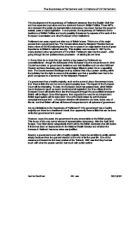In theory there is no body that can declare a law passed by Parliament as unconstitutional - though the full impact of the European Court is not yet known in 2002. Courts have taken on government decisions over technicalities such as when Michael Howard as Home Secretary sent the Jamie Bulgar killers to prison for an unspecified term. The Courts deemed this illegal as they decided that only a person working within the judiciary had the right to come to this decision and that a specified term had to be given as opposed to a sentence "at Her Majesty's Pleasure".
If a government has a healthy majority, such as the current Labour Government does, then there is little that can be done to stop it passing laws. The impact of the European Court will be interesting. To date, the European Court has passed laws, which Britain has to implement (such as recent environmental legislation) but it is unlikely that the European Court will decide that a law that has gone through the due political process in Britain will be illegal. Once this happens, then arguably the need for an independent British legal system will be redundant. One of the fears raised by anti-European campaigners is just that – a European directive will determine our laws, taxes, way of life etc. and that Britain will lose all forms of independence in all spheres of government.
Are any limitations to the Supremacy of Parliament? If the government has a healthy majority and there is no backbench revolt, then apparently there is little that can be done while that government is in power.
However, every five years, the government is very accountable to the British people. This is one of the very corner stones of representative democracy. After the April 2002 Budget, Tony Blair stated categorically that it will be the British electorate that will decide if there has been an improvement in the National Health Service and whether the increase in National Insurance rates was justified.
Second, a government even with a healthy majority, has to be sensitive to public opinion simply because there is a general election at the end of its five year life. One of the reasons put forward for the heavy defeat of the Tories in 1997 was that they had lost touch with what the people wanted; lost touch with public opinion.
Third, pressure groups do exert power on governments. It is impossible to measure this power as no government will admit to introducing legislation or reforming established law, simply because a pressure group has asserted itself.
Fourth, the government itself as represented by the executive, the Cabinet, may lose touch with rank and file backbench opinion. The 2001 Labour government has a very healthy parliamentary majority of 167 and can afford to upset a large chunk of backbenchers. In Easter 2002, over 100 Labour MP’s signed a petition stating that the government should not get involved in any military campaign against Iraq. At the time, the government was very bellicose about a military campaign. Within a week, this had dampened down and the public talk by the Cabinet was far more muted and the language used was far more diplomatic. Was this to do with the petition? Again, few if any governments will admit that they would have changed their policies as a result of pressure. But a government facing a vocal backbench rebellion looks weak and disunited. The public’s perception of such a government may not be good.
Therefore, the theory of the Supremacy of Parliament whereby a government can do as it wishes, does, in fact, have limitations. The current Labour government has faced internal party questions over the health service, education, defence policy and sleaze – so its huge parliamentary majority does not guarantee the supremacy of the executive within Parliament.







